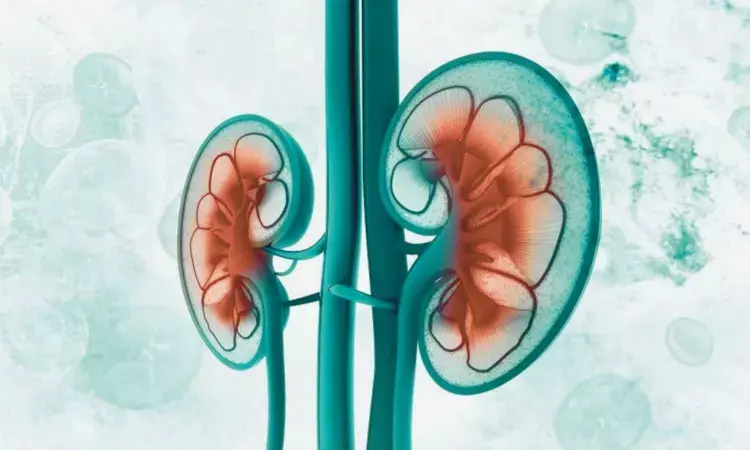- Home
- Medical news & Guidelines
- Anesthesiology
- Cardiology and CTVS
- Critical Care
- Dentistry
- Dermatology
- Diabetes and Endocrinology
- ENT
- Gastroenterology
- Medicine
- Nephrology
- Neurology
- Obstretics-Gynaecology
- Oncology
- Ophthalmology
- Orthopaedics
- Pediatrics-Neonatology
- Psychiatry
- Pulmonology
- Radiology
- Surgery
- Urology
- Laboratory Medicine
- Diet
- Nursing
- Paramedical
- Physiotherapy
- Health news
- Fact Check
- Bone Health Fact Check
- Brain Health Fact Check
- Cancer Related Fact Check
- Child Care Fact Check
- Dental and oral health fact check
- Diabetes and metabolic health fact check
- Diet and Nutrition Fact Check
- Eye and ENT Care Fact Check
- Fitness fact check
- Gut health fact check
- Heart health fact check
- Kidney health fact check
- Medical education fact check
- Men's health fact check
- Respiratory fact check
- Skin and hair care fact check
- Vaccine and Immunization fact check
- Women's health fact check
- AYUSH
- State News
- Andaman and Nicobar Islands
- Andhra Pradesh
- Arunachal Pradesh
- Assam
- Bihar
- Chandigarh
- Chattisgarh
- Dadra and Nagar Haveli
- Daman and Diu
- Delhi
- Goa
- Gujarat
- Haryana
- Himachal Pradesh
- Jammu & Kashmir
- Jharkhand
- Karnataka
- Kerala
- Ladakh
- Lakshadweep
- Madhya Pradesh
- Maharashtra
- Manipur
- Meghalaya
- Mizoram
- Nagaland
- Odisha
- Puducherry
- Punjab
- Rajasthan
- Sikkim
- Tamil Nadu
- Telangana
- Tripura
- Uttar Pradesh
- Uttrakhand
- West Bengal
- Medical Education
- Industry
Cystatin C-based eGFR Offers Valuable Insights into Renal Function in HIV/AIDS Patients on ART: Study

Uganda: As the global battle against HIV/AIDS continues, healthcare providers confront the multifaceted challenges posed by the disease, including its impact on renal function. In a groundbreaking development, a study conducted at Mildmay Uganda has shed light on the clinical utility of cystatin C-based estimated glomerular filtration rate (eGFR) in assessing renal function among HIV/AIDS patients receiving antiretroviral therapy (ART).
According to the study, cystatin C-based eGFR exhibited a high specificity and a high positive likelihood ratio in the diagnosis of kidney disease among HIV/AIDS patients on ART. Cystatin C-based eGFR can be used as a confirmatory test.
"Cystatin C-based eGFR's specificity at 99.3% & a high positive likelihood ratio of 18.81 with a diagnostic accuracy of 90.7%," the researchers reported in BMC Nephrology.
In clinical practice, estimated glomerular filtration rates (eGFR) measurement is the gold standard for assessing renal function the glomerular filtration rate is often determined from plasma creatinine. Previous studies have shown Cystatin C-based eGFR (Cys C) to be a better parameter for diagnosing impaired renal function. Cystatin C-based eGFR has been proposed as a potential renal function marker, but its use in patients with HIV/AIDS has not been well evaluated.
Against the above background, Enock Wekiya, Mildmay Uganda, Kampala, Uganda, and colleagues aimed to assess the clinical utility of Cystatin C-based eGFR in HIV-infected individuals on ART.
For this purpose, the researchers conducted a cross-sectional study on 914 HIV/AIDS patients on antiretroviral therapy attending Mildmay Uganda for care and treatment between January and March 2015. Particle-enhanced immunoturbidimetric assay was used to measure serum Cystatin C-based eGFR. Creatinine was analyzed using the enzymatic Creatinine PAP method, and creatinine clearance was calculated according to C&G.
The researchers reported the following findings:
· The sensitivity of Cystatin C-based eGFR was 15.1% with a specificity of 99.3%.
· The positive and negative predictive values were 70.0% and 91.2% respectively.
· The positive likelihood ratio was 18.81, and the negative likelihood ratio was 0.85.
· Cystatin C-based eGFR had a diagnostic accuracy of 90.7, and the area under the curve was 0.768.
In conclusion, the study showed that Cystatin C-based eGFR had a high specificity of 99.3% but a low sensitivity of 15.1%, implying that Cystatin C-based eGFR can be used as a confirmatory test, not as a screening test, a negative and positive predictive value of 91.2% and 70%, a high positive likelihood ratio of 21 and a negative predictive value 0.8 with a high diagnostic accuracy of Cystatin C based eGFR with the area under the curve of 0.77.
"While Inflammation can affect Cystatin C levels, leading to inaccuracies in eGFR calculations, in the study, we did not measure CRP, and thus future studies are needed to explore the impact of inflammation on Cystatin C-based eGFR results by considering including CRP testing in the study design," the researchers wrote.
Reference:
Wekiya, E., Mujuzi, G.P., Nakiyingi, J. et al. The clinical utility of cystatin C based eGFR in assessing renal function among HIV/AIDs patients on ART at Mildmay Uganda. BMC Nephrol 25, 144 (2024). https://doi.org/10.1186/s12882-024-03581-3
Dr Kamal Kant Kohli-MBBS, DTCD- a chest specialist with more than 30 years of practice and a flair for writing clinical articles, Dr Kamal Kant Kohli joined Medical Dialogues as a Chief Editor of Medical News. Besides writing articles, as an editor, he proofreads and verifies all the medical content published on Medical Dialogues including those coming from journals, studies,medical conferences,guidelines etc. Email: drkohli@medicaldialogues.in. Contact no. 011-43720751


